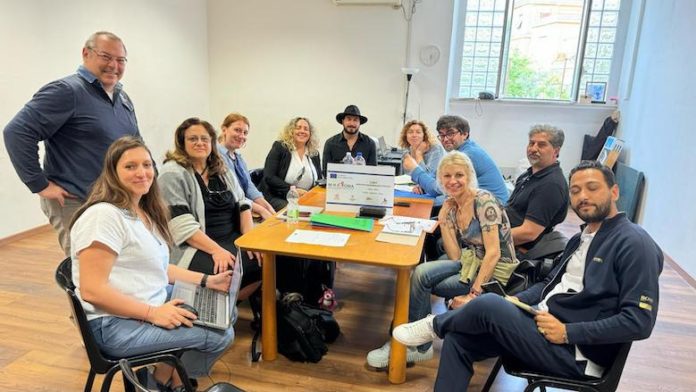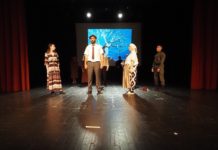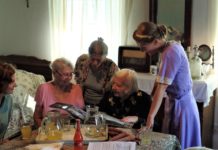The implementation of the EU project “MHE – ROMA – EUROPEAN HISTORICAL MEMORY OF ROMA”, in which Croatian Romani Union ”KALI SARA” acts as a beneficiary, started with a series of activities in April, 2024. The lead benificiary of the project is the Spanish Romani organization Nakeramos, and in addition to the Croatian romani Union ”KALI SARA”, other benificiaries include two Italian organizations – Roma Onlus and L’isola che c’è. The project is funded by the European Commission under the Citizens, Equality, Rights and Values program (CERV), and the implementation takes 16 months.
The lead beneficiary, the intercultural association Nakeramos, was founded in 2002 out of the need to create a space for positive interaction with the other cultures in and around Barcelona. The goals of their numerous programs are the revitalization of the Romani language, after the historical linguistic genocide in Spain, and the preservation of the Romani culture. The historical and social role of the distinguished Romani individuals and their contribution to the multiculturalism of Europe has been in its focus in recent years, so the “MHE-ROMA” project is the logical next step.
The idea for the “MHE-ROMA” project was born two years ago during activities that included young Roma, as well as non-Roma. Nakeramos is an organization that has been carrying out Roma empowerment projects for years, with an emphasis on social empowerment in terms of social and other rights, but also on intellectual empowerment with the aim of quality participation at all social levels, says Seo Cizmic, president of the organization. We want to permanently inscribe the tragic part of history, the genocide carried out against Roma during the Second World War, which has been silenced and forgotten for too long, into the collective memory of Roma and non-Roma. By preserving the memory, we contribute to raising awareness of its causes and the terrible consequences of intolerance and hatred.
The activities of the project involve young people aged 18 to 30 with the aim of strengthening awareness of Roma identity, i.e. history, language, culture, and tradition, with an emphasis on the history of European Roma, linguistic genocide, and genocide during the Second World War. Understanding one’s own identity means strengthening the sense of belonging and solidarity within the Roma nation, and for the wider non-Roma community, it represents a significant contribution to overcoming anti-Roma discrimination and improving social cohesion and active citizenship of young people. This topic is also well known to the Roma Onlus organization, whose president Graziano Halilović was one of the initiators of the long-running international project ”Dik i nabistar”, under the slogan ‘Naj sen bistarde — You are not forgotten!’
I have been living in Italy since childhood, where I also attended school, and for my peers I was never a Roma, I was always a ‘Gypsy’, Graziano Halilović begins his story and continues: I only became a Romani after visiting the areas of the former Yugoslavia when I started working on my self-confidence. It is difficult for a child and a young man of Roma nationality to build self-confidence because when everyone tells you that you are stupid, that you cannot speak, that you are lazy, and that school is not for you, and when they repeat this to you every day, you start to lose confidence in yourself and in your community . After returning to Italy, I persisted in getting an education, and then I started watching historical films, including those about the suffering of Jews during the Second World War. I knew that Roma were also victims and I started to research. I questioned family members, but no one wanted to talk about it. Because of the deep traumas and because of the life in the camps where Italian Roma still live today, there is an omnipresent fear of the possibility that one day they will turn into concentration camps again. That is why older Roma did not want to scare their children. However, I could not be satisfied with the information I learned and decided to travel to Poland, as part of the “Youth in Action” project. I remember it was January 27th when three of us colleagues, one from Germany, one from Spain and I from Italy, arrived in Poland and decided to visit the Auschwitz camp. The car left us about 700 meters from the entrance and we continued on foot. I was well dressed, in a warm jacket and gloves, but I was freezing, it was so cold. The Spaniard was lagging behind us and shouted to us that he could not go any further because he would freeze from the cold. A thought crossed my mind about how Romani and Jewish children and the elderly could have survived these conditions. My heart felt heavy. We entered the camp… I have never felt so sad, I cried, all three of us cried. I decided that everyone should know about that part of history. I wanted the young Roma to feel a deep sadness for the suffering of their ancestors in such an inhuman way, as I felt. Sorrow and pain due to injustice. We called the project ”Dik i nabistar – Look and don’t forget”. We started with groups of 20 people, and every year the number increased so that through our project over 30 thousand people from Europe, Canada, America, and Australia visited the Auschwitz camp. Over time, these mass tours have shown one big flaw, and that is the lack of active participation of young people in the project, the lack of evaluation, as if it were a tourist trip. My goal was for young Roma to become aware of this part of their history, and to do so in such a strong way that they speak about it to their children, because this is an indispensable building block of the identity of the Roma people.
The need for active participation of young people, who should not only be observers but also leaders of program activities, prompted Graziano Halilović and his organization Roma Onlus to be partners in the “MHE-ROMA” project.
I am very familiar with the work Nakeramos has done, and I have been cooperating with Mr. Cizmic for years, that’s why my organization Roma Onlus participated in the creation of the program and accepted the partnership with pleasure, says Halilović. Likewise, we have been following the work of the Croatian Romani Union “KALI SARA” , and its founder, Veljko Kajtazi, MP, for years, and we have nothing but words of praise and admiration for everything they have done for the Roma community not only in Croatia, but all over the world. ”KALI SARA” represents a role model for all Roma organizations in Europe and therefore we were extremely interested in them being our partners in this project. When we first visited the place of Romani genocide in Uštica and participated in the commemoration marking the International Romani Genocide Remembrance Day/ Samudaripen on August 2nd, it became clear that at this authentic location of Romani suffering, an incounter of young people with discrimination, repression and injustice committed against their ancestors should happen.
Distinguished Romani individuals, who have made a strong contribution to the cultural and social development of their community, such as the ‘mother of Romani literature’ Bronislawa Wajs Papusza, the German boxing champion Johann Wilhelm Trollmann Rukeli, the Righteous Among the Nations Hajrija Imeri Mihaljić and the writer, painter, activist, and musician Ceija Stojka, became victims of the Nazi genocidal policy, says Cizmic, and Halilović explains: There is little written about them and what happened to them in European school textbooks, few books and even fewer films. More than 80 years have passed and slowly their contemporaries, the living witnesses of that time are dying, and if we do not raise awareness of the atrocities of that historical period and do not familiarize young people with the historical injustices that happened to their people, it means that we have allowed the innocent victims to die once again, this time into oblivion.
Romani memories of Samudaripen are sad and difficult, while visiting the places of suffering isalways full of emotions. Given that genocides are often the result of ideologies of hatred, discrimination, or nationalism, they remind us of the need to oppose such destructive forces and promote the values of tolerance, equality, and respect for human rights. And this was exactly the reason why Italian organization L’isola che c’è, joined the project as one of the partners.
We decided to join the project because we deeply believe that remembering the past is the first step in preventing future crimes against humanity, says Tiziana Cristiano, head of the association, and continues: We believe that educating people, involving them in memory processes and promoting tolerance is an indispensable part in preventing the repetition of history, precisely of the worst negative events. These were our primary motives for partnering in the “MHE – ROMA” project. For the last five years, our organization has mainly carried out activities related to European gender equality projects. We worked on the representation of women in public discourse, that is, on removing the causes that prevent the presence of women in public spaces. We researched and highlighted the facts that speak about the role of women who have marked history, which is socially rather neglected, and which is extremely important for the empowerment of future generations. Young people must realize and understand that both sexes have contributed, i.e. both men and women have equally participated in the development of society throughout history, and today. Organizations from Slovenia and Luxembourg also participated in that program. As a conclusion of the project, we all focused on the list of those women who made an exceptional contribution to national history, about which we are also preparing an exhibition.
Tiziana Cristiano proudly mentions her organization’s additional project with which they wanted to contribute to the development of the green economy, “Urban Mobility”, which promoted riding bicycles instead of cars. The program included the older generation and young people intending to make young people aware of the power in their hands regarding social changes that will contribute to preserving the planet and strengthening a socially sensitive society in the future.
The first joint meeting of the “MHE-ROMA” partners was held in Rome from April 15 to 18 and was evaluated as very constructive, as it discussed in detail the strong and weak points of the project and how to strengthen them. To build a team, it is necessary to get to know each other and build trust because we will work together to achieve an important goal, which is to create a culture of remembrance of the Romani genocide, concludes Tiziana Cristiano, whose organization in Rome hosted the event.
Protection of the Romani language and its strengthening in everyday use, especially in culture is an important feature of this project. In this regard, the partners emphasize the role of the Croatian Romani Union “KALI SARA” and Veljko Kajtazi, who initiated the marking and recognition of the World Day of Romani Language, November 5th, and in cooperation with the Ministry of Culture of the Republic of Croatia, raised the issue of recognizing this national Romani day before the UNESCO Assembly. The Croatian Parliament was the first parliament in the world to recognize this Roma national day in 2012 at his initiative, just as it proclaimed August 2 as the International Roma Genocide Remembrance Day/ Samudaripen in 2015.
It is on that day, August 2, 2025, that the main activity of the “MHE-ROMA” project will take place – a solemn performance in Uštica, as a part of the annual commemoration, in front of the auditorium in of the Roma Memorial Center, in which young amateur actors, Roma and non-Roma from Spain, Italy and Croatia will take part. This performance will tell the story of the Romani people, the tragedy they experienced and death, but also of their perseverance, tenacity, and love of life through the characters of the late Roma individuals.












